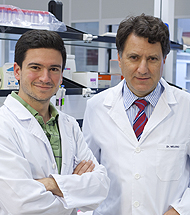Researchers from CIMA and the CNIC discover mechanisms that stimulate the antitumor response of the immune system.
This is a subgroup of antigen-presenting dendritic cells that generate tumor-cytotoxic T lymphocytes.

Researchers at research center Applied Medicine (CIMA) of the University of Navarra and the Carlos III National Center for Cardiovascular Research (CNIC) have discovered mechanisms that contribute to the antitumor response of the immune system. The results of this work have been published in the latest issue of the scientific journal Cancer Discovery.
Antigen-presenting cells are responsible for initiating and regulating the immune response to pathogens and tumors. Tumors, however, develop mechanisms to escape the control of the immune system by silencing the response of tumor-killing cytotoxic T lymphocytes.
In recent years it has been shown that the use of "immunoactivating" antibodies that reactivate silenced cytotoxic T cells is capable of stimulating a potent anti-tumor response. "In this work we have discovered that the generation of cytotoxic T cells that can be 'rescued'" by immunotherapy with anti-PD1 and anti-CD137 antibodies depends on a particular subpopulation of antigen-presenting cells. These are dendritic cells dependent on the transcription factor Batf3, which take antigens from the tumor cells and present them to the T lymphocytes, which then acquire the capacity to kill the tumor," explains Dr. Ignacio Melero, researcher of CIMA and the Clínica Universidad de Navarraand co-director of work, which is part of Alfonso Rodriguez's doctoral thesis .
Anti-PD-1 antibodies have recently demonstrated their efficacy in the first-line treatment of metastatic melanoma and non-small cell lung cancer. According to David Sancho, researcher of the CNIC and co-leader of the study, "elucidating the presenting cell that promotes the anti-tumor immune response can help us to design strategies to increase the efficacy of treatment with immunoactivating antibodies and to search for biomarkers that predict which patients will benefit from treatment. Our work suggests that these Batf3-dependent dendritic cells may be pivotal in anti-tumor immunotherapy."
The result is the result of the experience of the CNIC and the University of Navarra in the mechanisms of antigenic presentation and cancer immunotherapy, respectively.
Clinical applicationResearchers at CIMA and Clínica Universidad de Navarra are coordinating a European project in which the CNIC also participates to obtain these antigen-presenting cells from the blood of patients with tumors using cell selection techniques and formulate specific vaccines for the patient's tumor. "We have seen that their issue increases when using a growth factor called FLT-3L and by means of this agent we could increase their issue in patients who are receiving anti-PD-1 or anti-CD137 antibodies to boost efficacy through a combined treatment", assures Dr. Melero.
If the results are confirmed, the researchers are considering using these cells in cell therapy. "We also want to study whether this mechanism is deficient in patients who do not respond to anti-PD-1 treatment. Our hypothesis is that the response to anti-PD-1 correlates with the presence of this subpopulation of dendritic cells in tumor tissue," explain the authors of work.
The same issue of 'Cancer Discovery' includes a commentary "in the spot light", signed by Dr. Daniel Speiser, on the findings of the Spanish groups in which he highlights the importance of these discoveries to achieve greater efficacy in cancer immunotherapies that are already approved for clinical use and being developed for multiple indications in oncology".
